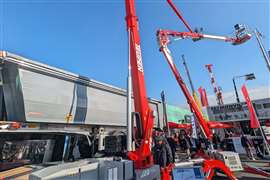Preparedness planning
15 November 2017
Harvey, Irma, Maria. Fires across the western United States. Monsoons in South Asia. Earthquakes in Mexico. Communities, cities, states, even whole countries have found themselves grappling with the aftermath of natural disasters recently. The costs in lives, infrastructure, goods and services and rescue/recovery efforts can nearly bankrupt local, or larger, economies – and put strain on a region for years as it tries to bounce back.
A lot of folks in our industry are familiar with the adage: You don’t want to let a crisis go to waste. Given the proper context, the message is simple: there are opportunities for companies in our line of work – provided that your fleet, yard, warehouses or headquarters isn’t underwater, etc. – to take part in the recovery and/or rebuild within an area that has been affected by a disaster. In doing so, you might also find long-term opportunities for your business.
Typically, the initial surge of support from the general public by way of donations tapers off as certain needs are met, and, especially in this golden age of news cycles, most eyes and ears move on to the next story.
Which isn’t to say that these areas, and the people living there, aren’t still in need of massive amounts of recovery/rebuilding. They literally and figuratively need someone to come in and do the heavy lifting – the moving – and it’s our job to get out in front of these openings. Not only will we contribute to the recovery of a region, and its people, long after the media and public interest has moved on to the next story, but we may find a new market in the process, new partnerships, new long-term opportunities.
Perspective and process
Strategy+Business recently put out a “How Your Business Can Help in Recovery Efforts” chart, listing four key considerations:
- Commit resources for the long term.
- Take the time to find out what affected communities need most.
- Get engaged in civil dialogue.
- Consider how you’ll surge in the next disaster.
In the accompanying piece, Eric J. McNulty articulated: “When it comes to natural disasters, response is dramatic, recovery is grueling … It is hard, necessary, important work. And it is an area where businesses can contribute in significant ways.”
In regards to committing resources, McNulty said: “As you consider raising money, providing supplies, or offering your employees for paid days of service, think as strategically about the investment as you would about anything you would do for your business. Don’t think in terms of days or weeks. Think years.”
He also emphasized the importance of making sure your contribution has the greatest impact. “It may be money – or school supplies, carpentry skills, or something else [find out what communities need most].”
Spotlighting civic dialogue, McNulty underscored: “If your facilities are in the affected areas, your executives can, and should, play an important role in these discussions. If you, your suppliers or
your major customers are in an area that could be affected by a future event – which is just about everywhere – become involved prospectively. Look beyond your facilities to think about
the public infrastructure on which you, your employees, customers and
suppliers depend. Help move the focus from short-term cost to resilience over the long haul.”
Recognizing that there will certainly always be another “disaster,” and the
need for public and private sector executives to better predict and align surge capacity and needs at the state and local level, McNulty added: “Business leaders can be a powerful force for good when they become involved in preparedness, response and, perhaps most enduringly, recovery.”
Ultimately, whether the world needs built, or re-built, it’s our job to assess the landscape, roll up our sleeves and take note of any opportunities that emerge as a result of hard work and heavy lifting.






